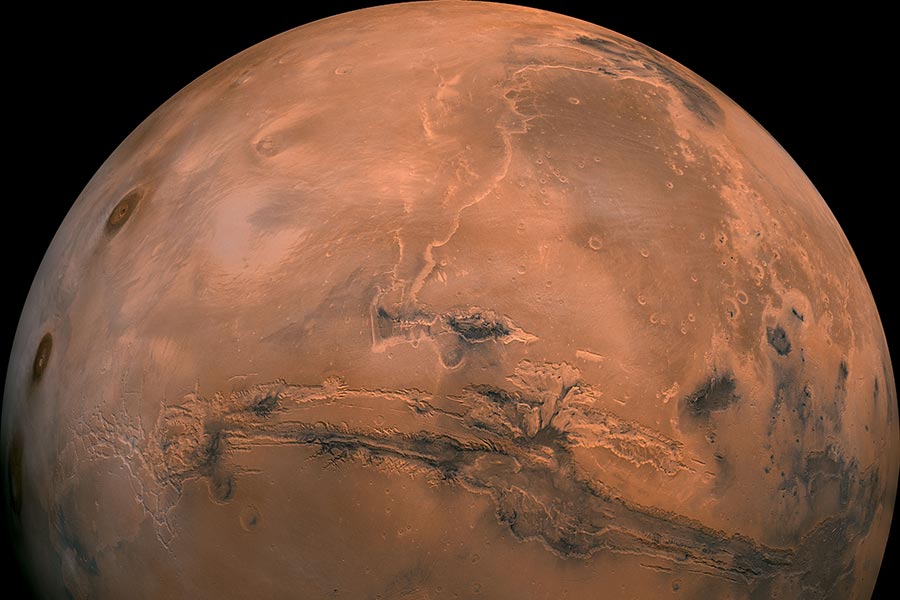 Parler
Parler Gab
Gab
They then showed that these patterns match computer model predictions for how a body of water beneath the ice cap would affect the surface.
Mars has thick water ice caps at both of its poles, like Earth, which are roughly equivalent in combined volume to the Greenland Ice Sheet.
However, unlike Earth's ice sheets, which have large subglacial lakes and water channels beneath them, Mars' polar ice caps have been thought to be frozen solid all the way to their bedrock due to the Red Planet's frigid climate.
Temperatures on Mars average a bone-chilling -81 degrees Fahrenheit but can drop as low as -220 degrees Fahrenheit in winter at the poles.
This most recent research, which was published last week in the journal Nature Astronomy, coincides with previous findings using ice-penetrating radar that were originally believed to have displayed an area that potentially holds water beneath the ice.
"The combination of the new topographic evidence, our computer model results and the radar data make it much more likely that at least one area of subglacial liquid water exists on Mars today, and that Mars must still be geothermally active in order to keep the water beneath the ice cap liquid," explained Prof. Neil Arnold of the Cambridge Scott Polar Research Institute, who led the research team. The researchers used several techniques in order to come up with their findings, including NASA’s Mars Global Surveyor satellite, DailyMail.com reported. "The quality of data coming back from Mars, from orbital satellites as well as from the landers, is such that we can use it to answer really difficult questions about conditions on, and even under the planet’s surface, using the same techniques we also use on Earth," Arnold added. SpaceX and Tesla founder and CEO Elon Musk has often said he believes someday in the not-too-distant future his company will be capable of sending humans to Mars. "It's something we can do in our lifetimes," he told an audience of 100,000 viewers at the International Astronautical Congress in Guadalajara, Mexico, in 2016. "You could go." He has also said he has a target date of 2029. Sources include: NPR.org DailyMail.co.ukAs they lose arguments, climate scientists call for ban on dissenting views
By Ethan Huff // Share
Researchers share 3 key steps to ensure optimal brain health
By Mary Villareal // Share
OIG audit reveals majority of NIH-funded trials FAILED to meet federal requirements
By Zoey Sky // Share
British government funding experiments that involve feeding African children INSECTS
By Arsenio Toledo // Share
Studies: Vitamin C helps maintain healthy vision as you age
By Zoey Sky // Share
Governments continue to obscure COVID-19 vaccine data amid rising concerns over excess deaths
By patricklewis // Share
Tech giant Microsoft backs EXTINCTION with its support of carbon capture programs
By ramontomeydw // Share
Germany to resume arms exports to Israel despite repeated ceasefire violations
By isabelle // Share










